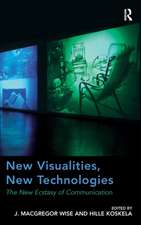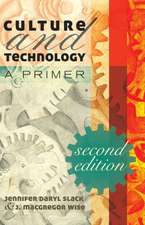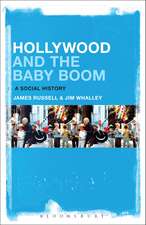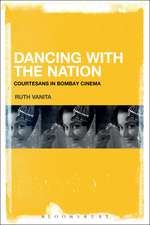Surveillance and Film
Autor J. Macgregor Wiseen Limba Engleză Paperback – 7 sep 2016
| Toate formatele și edițiile | Preț | Express |
|---|---|---|
| Paperback (1) | 165.03 lei 6-8 săpt. | |
| Bloomsbury Publishing – 7 sep 2016 | 165.03 lei 6-8 săpt. | |
| Hardback (1) | 567.99 lei 6-8 săpt. | |
| Bloomsbury Publishing – 7 sep 2016 | 567.99 lei 6-8 săpt. |
Preț: 165.03 lei
Nou
Puncte Express: 248
Preț estimativ în valută:
31.58€ • 33.04$ • 26.23£
31.58€ • 33.04$ • 26.23£
Carte tipărită la comandă
Livrare economică 02-16 aprilie
Preluare comenzi: 021 569.72.76
Specificații
ISBN-13: 9781628924855
ISBN-10: 1628924853
Pagini: 208
Ilustrații: 20 bw illus
Dimensiuni: 152 x 229 x 17 mm
Greutate: 0.3 kg
Editura: Bloomsbury Publishing
Colecția Bloomsbury Academic
Locul publicării:New York, United States
ISBN-10: 1628924853
Pagini: 208
Ilustrații: 20 bw illus
Dimensiuni: 152 x 229 x 17 mm
Greutate: 0.3 kg
Editura: Bloomsbury Publishing
Colecția Bloomsbury Academic
Locul publicării:New York, United States
Caracteristici
Includes text boxes with important details of relevant films, resources for further reading and end of chapter questions
Notă biografică
J. Macgregor Wise is a Professor of Communication Studies at Arizona State University, USA, where he writes and teaches about cultural studies of technology, globalization, and surveillance. He is the author of Exploring Technology and Social Space (1997) and Cultural Globalization: A User's Guide (2008) and co-author of Culture and Technology: A Primer (with Jennifer Daryl Slack; Second edition, 2015) as well as the second edition of MediaMaking (with Lawrence Grossberg, Ellen Wartella, and D. Charles Whitney, 2005). He is co-editor of New Visualities, New Technologies: The New Ecstasy of Communication (with Hille Koskela, 2013) and a former editor of the journal Communication and Critical Cultural Studies. He has been teaching about surveillance and popular culture since 2000.
Cuprins
List of ImagesAcknowledgements Introduction: Mapping the Surveillant ImaginaryChapter One: The WatchersChapter Two: The WatchedChapter Three: Surveillance SocietiesChapter Four: ProceduralsChapter Five: The Thrill of the RealConclusion: Some Must WatchNotesWorks CitedIndex
Recenzii
Wise claims this book is not a survey of surveillance film; he is right. This work is infinitely more useful. The examples chosen display a curatorial expertise that only comes from years of immersion in the subject. Wise combines close, textual reading of individual movies, thematic analysis, and historical contextualisation to create that most elusive of scholarly achievements: an eminently accessible yet original contribution. Teachers, students, and researchers will all find something of use in Wise's brilliant analysis of the surveillant imaginary. Guiding the reader through surveillant subjectivities, aesthetics, politics, and structures of feeling, this book fully unpacks the meaning of surveillance films in the contemporary conjuncture.
This book is not (only) about a certain group of films, but about the surveillance culture we live in: Its central concern is the taken-for-grantedness of the myriad technologies that monitor, record, and process the minutiae of our daily lives. By discussing not only the classics of popular surveillance fiction (The Truman Show, Enemy of the State, and many more), but also lesser known, but not less intriguing examples of this genre, Wise provides us with important philosophical, historical, and sociological insights into how surveillance practices and technology came to pervade our everyday lives. It is highly readable and balances detailed analysis of the films with the most current theoretical concepts in surveillance studies. This publication is recommended to students and scholars of film and media studies as well as the social sciences.
With enviable clarity and insight, Wise demonstrates how film provides a rich set of cultural resources for addressing one of the pressing questions of our time: how to think about the surveillance society we are building for ourselves. Drawing on a wide range of films, he probes in original, productive, and sometimes surprising ways the relationship between desire, control, and the monitoring gaze. This book is a work of care -- Wise is a careful and generous interpreter -- but also one of concern about our increasingly monitored moment.
"Overall, Wise provides an accessible and engaging introduction to surveillance in film, and each of the five main chapters considers a number of critical questions about surveillance more generally."
This book is not (only) about a certain group of films, but about the surveillance culture we live in: Its central concern is the taken-for-grantedness of the myriad technologies that monitor, record, and process the minutiae of our daily lives. By discussing not only the classics of popular surveillance fiction (The Truman Show, Enemy of the State, and many more), but also lesser known, but not less intriguing examples of this genre, Wise provides us with important philosophical, historical, and sociological insights into how surveillance practices and technology came to pervade our everyday lives. It is highly readable and balances detailed analysis of the films with the most current theoretical concepts in surveillance studies. This publication is recommended to students and scholars of film and media studies as well as the social sciences.
With enviable clarity and insight, Wise demonstrates how film provides a rich set of cultural resources for addressing one of the pressing questions of our time: how to think about the surveillance society we are building for ourselves. Drawing on a wide range of films, he probes in original, productive, and sometimes surprising ways the relationship between desire, control, and the monitoring gaze. This book is a work of care -- Wise is a careful and generous interpreter -- but also one of concern about our increasingly monitored moment.
"Overall, Wise provides an accessible and engaging introduction to surveillance in film, and each of the five main chapters considers a number of critical questions about surveillance more generally."






















